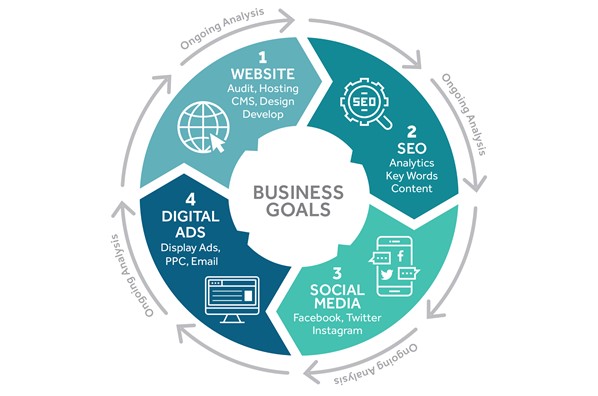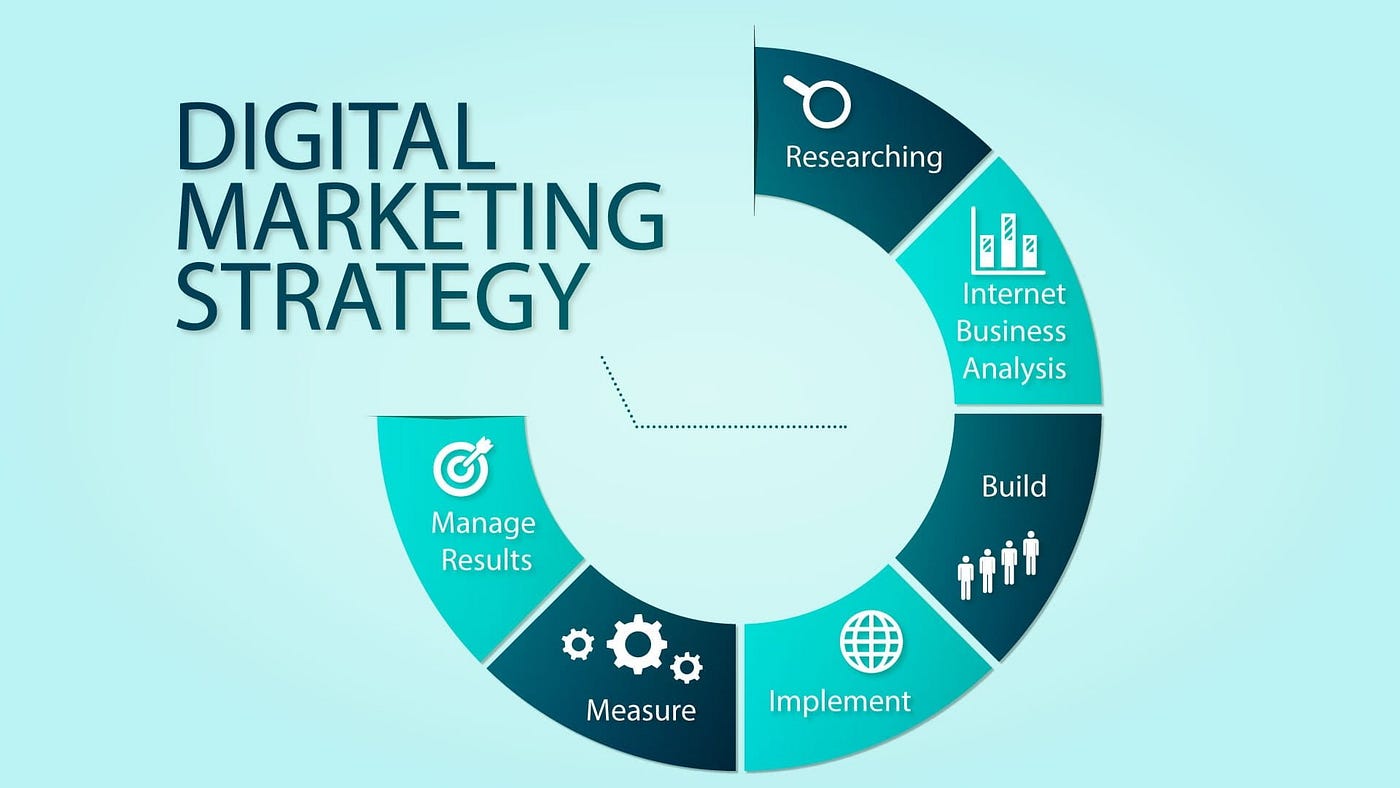Effective Digital Marketing Strategies for Business Growth
In today’s digital world, digital marketing is an essential tool for business growth. Whether you are a small startup or an established company, leveraging the right digital marketing strategies can help you reach a wider audience, increase brand visibility, and drive sales. In this article, we will explore the most effective digital marketing strategies that can elevate your online presence and boost your business.

1. Understanding Digital Marketing
Digital marketing refers to the use of online platforms, tools, and technologies to promote products and services. This encompasses various methods, such as social media marketing, content marketing, SEO (Search Engine Optimization), email marketing, and more. The main goal is to engage with customers online, enhance brand awareness, and ultimately drive sales.
Key Benefits of Digital Marketing:
-
Broader Reach: Access to a global audience through online platforms.
-
Cost-Effective: Digital marketing offers affordable options compared to traditional marketing.
-
Targeted Approach: Ability to target specific audiences based on interests, behaviors, and demographics.
By integrating the right digital marketing strategies, you can effectively engage your target audience and achieve your business goals.
2. Search Engine Optimization (SEO)
Search Engine Optimization (SEO) is a foundational digital marketing strategy. It involves optimizing your website and content to rank higher on search engine results pages (SERPs). Higher rankings lead to increased visibility and more organic traffic, which can directly translate into more customers.
Key SEO Techniques:
-
Keyword Research: Identifying the most relevant keywords for your business and incorporating them into your content.
-
On-Page Optimization: Ensuring that your website’s content, structure, and images are optimized for search engines.
-
Link Building: Acquiring backlinks from reputable websites to improve your website’s authority.
SEO is a long-term strategy, but the benefits, including increased organic traffic and improved brand credibility, make it essential for any business with an online presence.

3. Social Media Marketing
Social media marketing allows businesses to connect with their audience on platforms like Facebook, Instagram, Twitter, LinkedIn, and TikTok. This strategy is excellent for building brand awareness, fostering engagement, and driving traffic to your website.
Tips for Successful Social Media Marketing:
-
Choose the Right Platforms: Focus on platforms that are popular with your target audience.
-
Create Engaging Content: Post content that resonates with your audience, including images, videos, and interactive posts.
-
Consistency is Key: Post regularly and at optimal times to ensure maximum reach and engagement.
Social media marketing offers an excellent opportunity to humanize your brand and engage with your audience on a personal level.
4. Content Marketing
Content is king when it comes to digital marketing. High-quality content not only drives traffic but also positions your brand as an authority in your industry. This can include blog posts, videos, infographics, eBooks, and other forms of valuable content.
Effective Content Marketing Strategies:
-
Blogging: Regularly publishing informative and well-optimized blog posts can improve SEO and drive traffic.
-
Video Marketing: Videos are highly engaging and can help explain complex ideas in an easy-to-understand manner.
-
Guest Posts: Contribute guest posts to authoritative websites to build backlinks and gain exposure.
By offering valuable content, you can build trust with your audience, educate them, and nurture long-term relationships.
5. Email Marketing
Email marketing is one of the most effective ways to communicate directly with your audience. With a personalized email strategy, businesses can share promotions, updates, and content that keeps customers engaged.
Tips for Successful Email Campaigns:
-
Segment Your List: Send targeted emails based on customer demographics, interests, or behavior.
-
Create Compelling Subject Lines: A strong subject line can significantly improve your open rates.
-
Use Call-to-Action (CTA): Encourage recipients to take action, whether it’s visiting your website or making a purchase.
Email marketing remains one of the highest ROI-generating strategies for businesses looking to nurture leads and retain customers.

6. Pay-Per-Click Advertising (PPC)
Pay-Per-Click (PPC) advertising allows businesses to display ads on search engines and pay only when a user clicks on their ad. Google Ads is one of the most popular PPC platforms. This strategy can drive immediate traffic to your website and generate leads quickly.
PPC Best Practices:
-
Keyword Targeting: Choose keywords that align with your business goals and have high search volumes.
-
Compelling Ads: Create ads that attract attention and encourage users to click.
-
Track and Optimize: Continuously monitor your PPC campaigns to optimize performance and reduce costs.
PPC advertising is an excellent way to generate quick results, especially if you are targeting competitive keywords or promoting time-sensitive offers.
7. Influencer Marketing
Influencer marketing involves partnering with individuals who have a significant following on social media platforms or blogs. These influencers can promote your products or services to their audience, helping you reach a wider group of potential customers.
How to Leverage Influencer Marketing:
-
Choose the Right Influencers: Look for influencers whose audience aligns with your target market.
-
Establish Clear Goals: Set objectives for the campaign, such as increasing brand awareness or boosting sales.
-
Measure ROI: Track the effectiveness of influencer campaigns through engagement metrics and conversions.
Influencer marketing has proven to be highly effective for businesses in many industries, especially those targeting younger demographics.

8. Affiliate Marketing
Affiliate marketing involves partnering with affiliates who promote your products or services in exchange for a commission on each sale or lead generated. It is a performance-based marketing strategy, which means you only pay when the affiliate drives results.
Tips for Affiliate Marketing:
-
Choose Affiliates Wisely: Partner with affiliates who have an established audience in your industry.
-
Offer Competitive Commissions: Provide incentives that motivate affiliates to promote your brand.
-
Track Performance: Use affiliate tracking software to monitor the performance of each affiliate and optimize accordingly.
Affiliate marketing can be a cost-effective way to expand your reach and grow your customer base.
9. Mobile Marketing
With the increasing use of smartphones, mobile marketing is a crucial component of any digital strategy. Mobile-friendly websites, apps, and SMS campaigns can help businesses reach customers wherever they are.
Key Mobile Marketing Strategies:
-
Mobile-Friendly Website: Ensure your website is responsive and provides a seamless experience on mobile devices.
-
SMS Marketing: Send time-sensitive offers, reminders, or updates directly to your customers’ mobile phones.
-
App-Based Marketing: Develop a mobile app that offers value to your customers and keeps them engaged.
Optimizing for mobile is no longer optional – it’s essential for staying competitive in today’s market.
10. Analytics and Data-Driven Decisions
Finally, successful digital marketing relies on data. Using analytics tools like Google Analytics, businesses can track website traffic, user behavior, conversion rates, and much more. These insights help you make data-driven decisions and continuously improve your strategies.
How to Use Data Effectively:
-
Track Key Metrics: Focus on metrics like traffic, engagement, and conversion rates to measure success.
-
Test and Optimize: A/B testing can help identify which strategies are most effective and drive better results.
-
Adjust Based on Insights: Use the data to tweak your marketing strategies and improve your ROI.
Data is a powerful tool that allows businesses to understand their audience better and make informed decisions for continued growth.
Frequently Asked Questions (FAQs)
1. What is the most effective digital marketing strategy?
There is no one-size-fits-all answer, as the most effective strategy depends on your goals and audience. However, a combination of SEO, content marketing, and social media marketing is often the most successful for many businesses.
2. How can I track the effectiveness of my digital marketing campaigns?
You can track your digital marketing efforts using tools like Google Analytics, social media insights, and email marketing platforms. Pay attention to metrics such as traffic, engagement, and conversion rates to evaluate success.
3. Is digital marketing suitable for small businesses?
Yes, digital marketing is highly effective for small businesses. With relatively low costs and the ability to target specific audiences, small businesses can greatly benefit from digital marketing strategies.
4. How can I improve my website’s SEO?
To improve your SEO, focus on optimizing your website’s content with relevant keywords, improving site speed, building quality backlinks, and ensuring mobile-friendliness.
Conclusion
Digital marketing is a dynamic and powerful tool for driving business growth. By implementing a combination of strategies, such as SEO, content marketing, PPC, and social media marketing, businesses can build a strong online presence and connect with their target audience. Remember, the key to success is consistency and data-driven decisions. Start incorporating these strategies today to see tangible results in your business.

